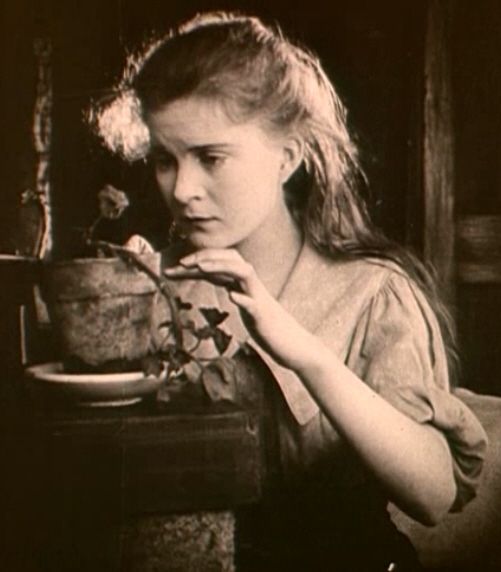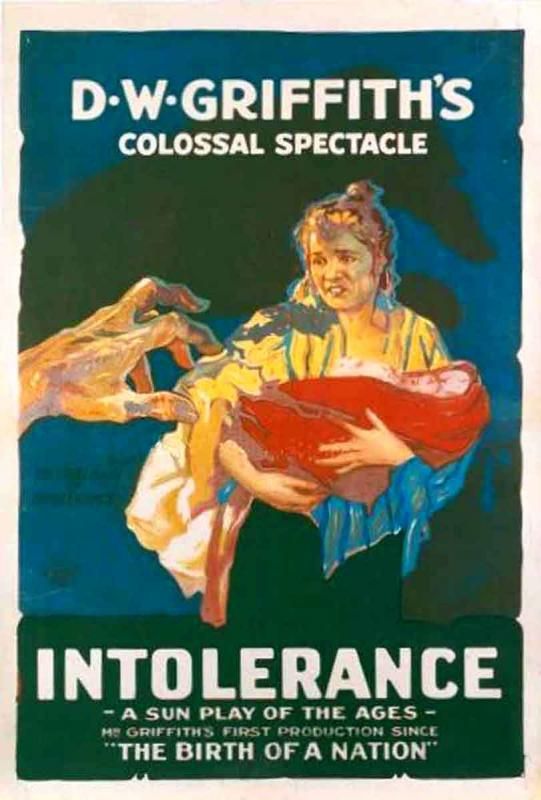Intolerance
1916
Director: D.W. Griffith
Starring: Lillian Gish, Mae Marsh,
Robert Harron, Constance Talmadge, Alfred Paget
Oh,
D.W. Griffith, you so crazy. You get all
mad when people bust on you cuz they don’t understand yo politickin’ in Birth
of a Nation, so instead you get all up in their business with Intolerance,
yo! You all, ‘yo people always be
beatin’ on the downtrodden, it’s in the history books, man!’ And you make a crazy whack movie that’s
fifteen hours too long to prove it! What
up with that!
OK,
I’ll stop that now. Somehow D.W.
Griffith is much more amusing to me if I picture him as a ghetto thug.
Made
in direct response to those who dared point out the racial controversies
aplenty in Birth of a Nation, Intolerance tells four separate
tales, each dealing with the theme of intolerance, and usually set against the
backdrop of a love story. We have
classic episodes from Jesus’ life, a story in Ancient Babylon about a Mountain
Girl (Talmadge) who falls in love with Prince Belshazzar (Paget), a tale of
doomed love during the Catholic/Huguenot tensions in sixteenth century France,
and a modern tale following Dear One (Marsh) as her life goes from poor to
poorer to poorest, all in the name of the “Social Uplifters” who honestly
believe they’re improving society.
Throughout it all, we continually cut to Lillian Gish who sits rocking a
cradle as the “Eternal Mother.”
 |
| This = epic, especially for 19-freaking-16. |
There
are a few reasons why you should commit three plus hours of your life to
watching this silent film. First of all,
as my husband even managed to intuit, D.W. Griffith was groundbreaking in his
development of what we call “the language of film.” In Intolerance, just as in Birth
of a Nation, we have a sense of altered shot composition to build
dramatic tension. He cuts, and
frequently. He doesn’t simply set up a
static camera and let the entire scene unfold.
We go from close-up to mid-shot to crowd shot to reaction shot
throughout the entire movie. There is a
definite storyteller’s sensibility to Griffith’s work. He knows how to edit and compose, and it’s
easy to understand why the Soviet filmmakers of the twenties and thirties, like
Eisenstein, were inspired by him.
Furthermore, Intolerance essentially single-handedly invented the concept of
telling multiple tales at the same time.
The four stories mentioned above are constantly intercut throughout the
film. This had never been done before;
several intertitles at the beginning of the film explain that this is the
structure because shoot, the audience would realize that’s what Griffith was
doing! The idea of intercutting between
parallel stories is a technique so familiar to us nowadays, so give credit
where credit is due. Griffith invented it.
Additionally,
the scope of Intolerance is epic.
Most impressive is the Babylonian sequence. Griffith had everything built specifically
for this film, and when you see the size of the walls and sets, all the
costumes and props, it’s hard not to be impressed. The battle for Babylon is easily the most
exciting portion of the film, and Griffith doesn’t hold back. There are fires, boiling oil, battle turrets
being toppled, spears shooting into people’s bodies, and what looks like
thousands of extras. There was no CGI to
create an army in 1916, so Griffith, if he wanted it to look impressive, had to
actually build everything. Say what you
will about Intolerance, it’s big scale, big budget, in a big way. Michael Bay would be proud.
 |
| OK, this bit was cool. |
However,
that’s about all the reason I can come up with for sitting through over three
hours of people wringing their hands. Intolerance
may be grand and its storytelling technique and undoubtedly innovative, but
it’s not entertaining. Despite
Griffith’s intertitles that help explain what story we’re now moving to, there
is still some confusion as to who is who and what’s happening – having a cast
so large will do that. Furthermore, the
acting is atrocious. Lillian Gish is
good and likeable in everything I’ve seen her in, but she’s not really *in* Intolerance. Every twenty minutes or so, we cut back to
her rocking a cradle, but really, that’s not exactly an acting challenge. Instead, I’m subjected to a focus on Mae
Marsh in the modern story. I’ve decided
I hate Mae Marsh, and if I never see another movie with her in it before I die,
I’ll be happy. Everything you can
possibly imagine about silent film actors overacting, she does, and in
spades. She thrashes around the room in
order to convey emotion; it’s as though she’s having an epileptic fit of some
kind. Oh, was that supposed to be
joy? Looked like a drug-induced episode
to me, and Talmadge as the Mountain Girl isn’t much better. There is zero subtlety, but I wasn’t exactly
expecting any in a movie from 1916.
 |
| I kind of sort of hate you, Mae Marsh. |
Furthermore,
I see absolutely no reason why Intolerance clocks in at just over three
hours. The amount of dead time in this
film is ridiculous. The Babylon battle
is exciting, but at twenty minutes, it could have been edited down by half and
been just as exciting. Nearly every
other sequence in the film fits this description – too long. I’m watching the same thing over and over and
OVER again. I get it! Move on!
Yes yes, Mae Marsh is making weepy faces at her baby, I don’t need a
five minute shot to establish the fact that she’s sad. Yes yes, there’s a big ceremony in Babylon, I
don’t need fifteen minutes of footage to prove this. Yes yes, the evil Pharisees are evil, I don’t
need a protracted Evil Look of Evil that lasts for one minute to get the point
across. Everything moves at a snail’s
pace in this movie. It’s long, and it’s
boring, and it’s slow. Yes, Griffith is
smart in his editing to tell his story in a unique visual way, but I just wish
he’d realized his audience doesn’t need to be told the same thing over and over
again seventeen times in order to understand a point.
 |
| And then, of course, there's Jesus. I don't know even know... |
Ultimately,
as my husband says, the title of the movie is fairly fitting. Intolerance is rather
intolerable. Yet again we have a
Griffith epic that, while not being as morally repugnant as Birth
of a Nation, is no less preachy and whiny and long and dull. I don’t discount Griffith entirely; there are
films of his I actually like. But this
one ain’t one of them.
Arbitrary
Rating: 4/10

Aside from the giant battle sequence, I called this one several hours of preaching, bad behavior, and overacting.
ReplyDeleteNot my favorite by a long stretch.
Yep. Blech. Too much. And it's really a shame too, because I remember being vaguely excited to watch Intolerance the first time around. THAT faded fast.
DeleteAs you mentioned, the Babylon sequence is worth watching, but I wouldn't recommend any of the others.
ReplyDeleteNo, not at all. I couldn't even make it through rewatching the whole thing. I had it on in the background, was reminded of its dullness, wrote what I had to say, then said "to hell with that, let's do something fun!"
DeleteI love your portrait of Griffith as a ghetto thug. That offended, pompous, but ultimately stupid and deluded tone fits him and the movie so well. Of course you are right about the technique and the scale of the sets, but the backbone of any movie is the story it tries to tell and here everything stinks so bad. Griffith is feeling soo sorry for himself and place the treatment of him and his film equal to those historic injustices. If only I could figure what eaxctly was so intolerable in those chapters that would help me a bit. It just washes out for me and becomes as you so eloquently put it, intolerable.
ReplyDeleteYeah, I don't think it's fair to entirely write off Intolerance, because there's some cool stuff there. But jeezy creezy, the package it comes in is soooooooooooo dull, and it definitely feels preachy and manipulative. Griffith was a bit whiny, wasn't he. It's hard out there for a pimp!
Delete"Intolerable" is a good title for this one! I'm glad we feel the same way about Mae Marsh. I couldn't stand her performance either.
ReplyDeleteHistrionic, thy name is Mae Marsh. I like some Griffith (Orphans of the Storm was the very first silent film I ever saw and I have a soft spot for it), but most is just yuck.
Deletemoncler outlet
ReplyDeletegoyard
yeezy
goyard handbags
moncler
supreme t shirt
supreme clothing
golden goose
goyard handbags
golden goose sneakers
replica prada nylon bags Home Page z3m49n6l33 replica bags wholesale in divisoria see here now d6k02w4b96 Louis Vuitton replica Bags replica bags paypal replica bags review look at here y0l97x2v14 replica bags paypal
ReplyDelete